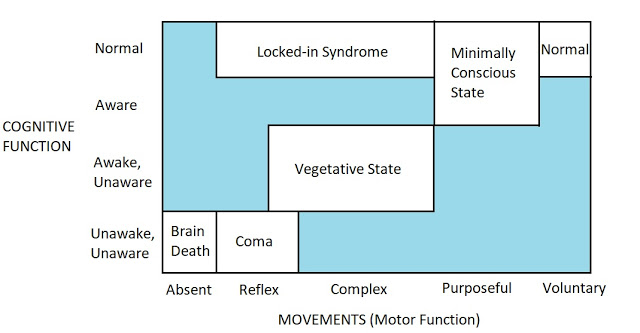昏迷程度(已解释)

Table of contents
昏迷是一种无法唤醒的无意识状态。 处于昏迷状态的人既不清醒,也没有意识。 他还活着,但无法对刺激做出反应。
您或许可以通过摇晃或大声说话来唤醒熟睡的人,但这对昏迷的人不起作用。
See_also: 13 个情绪低落者的特征人在头部严重受伤时通常会陷入昏迷,这种情况可能会导致大脑在头骨中来回移动,从而撕裂血管和神经纤维。
这种撕裂会导致脑组织肿胀,从而压迫血管,阻碍血液(进而氧气)流向大脑。
正是大脑供氧不足损害了脑组织,导致意识丧失,表现为昏迷。
脑炎、脑膜炎、低血糖和高血糖也可能导致昏迷。
昏迷程度或水平
昏迷的程度取决于伤病的严重程度。 昏迷属于意识障碍的一种,代表不同程度的昏迷。
为了理解这些类型的昏迷状态,假设杰克在一次事故中头部受伤。
如果杰克的大脑完全失去功能,医生说他会 大脑死亡 这意味着他永远失去了知觉和呼吸能力。
See_also: 14 邪教领袖的特征如果杰克滑入 昏迷 在昏迷状态下,大脑并没有完全关闭,而是在最低水平上工作。 他可能有呼吸能力,也可能没有呼吸能力,但对任何刺激(如疼痛或声音)都没有反应。 他不能进行任何自主动作。 他的眼睛一直闭着,昏迷状态下没有睡眠-觉醒周期。
比如说,在昏迷几周后,杰克出现了恢复的迹象。 他现在可以睁眼、眨眼、睡觉、醒来和打哈欠。 他还可以移动四肢、咧嘴笑和做咀嚼动作,但仍然无法对刺激做出反应。 这种状态被称为 "昏迷"。 植物人状态 .
杰克可能不会陷入植物人状态,而是陷入所谓的微意识状态。 在这种状态下,杰克可以表现出非反射性和有目的的行为,但无法与人交流。 他的意识是间歇性的。
如果杰克意识清醒,可以醒来和入睡,甚至可以用眼睛交流,但却无法(部分或完全)进行自主行动,那么他就处于锁定状态。 他算是被锁定在自己的身体里了。
对病人进行全身麻醉,使他们暂时失去知觉,这样就可以进行大型手术和外科手术,否则会非常痛苦。 全身麻醉可被视为人工诱导的可逆昏迷2。

从昏迷中恢复
昏迷通常只持续几周,患者可以逐渐恢复,从无意识过渡到有意识。 通过治疗和锻炼对大脑进行刺激,可以帮助患者恢复。
据推测,大脑回路需要刺激和激活才能恢复正常功能。
事实上,一项研究表明,听到家人重复讲述熟悉故事的昏迷患者的意识恢复速度明显快于那些没有听到任何此类故事的患者,而且恢复情况也有所改善。
昏迷时间越长,康复的机会就越小,但也有昏迷 10 年和 19 年后仍能康复的病例。
人们为何会进入无意识状态
如果电路中通过的电流过大,电子设备中的安全保险丝就会熔化并断开电路。 这样就能保护设备和电路免受损坏。
受伤诱发昏迷的原理基本相同,只是大脑并没有完全关闭(如脑死亡),而是在最低水平上运行。
当大脑检测到严重的内伤时,它会让你进入昏迷状态,以避免任何进一步的随意移动,最大限度地减少失血,并调动身体资源修复对生命的直接威胁。
从这个意义上说,昏迷与威胁诱发的昏厥非常相似。 昏厥是对潜在威胁的反应,而昏迷则是对实际威胁的反应。 昏厥可以防止你受伤,而昏迷则是在你实际受伤时,你的大脑为拯救你所做的最后尝试。
参考资料
- Mikolajewska, E., & Mikolajewski, D. (2012)。《脑干活动失灵可能导致的意识障碍--计算方法》。 健康科学杂志 , 2 (2), 007-018.
- Brown, E. N., Lydic, R., & Schiff, N. D. (2010).全身麻醉、睡眠和昏迷。 新英格兰医学杂志 , 363 (27), 2638-2650.
- 西北大学(2015 年 1 月 22 日)。 家庭的声音和故事加速了昏迷的恢复。《科学日报》。2018 年 4 月 8 日从 www.sciencedaily.com/releases/2015/01/150122133213.htm 检索。
- Buss, D. (2015). 进化心理学:心灵的新科学 心理学出版社。

